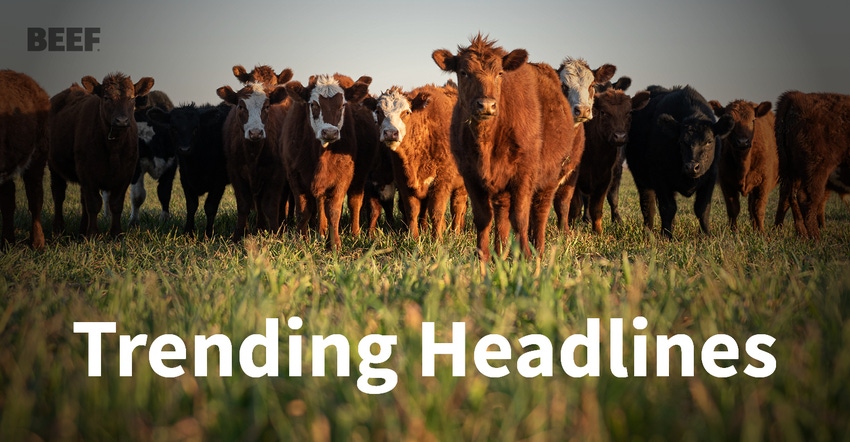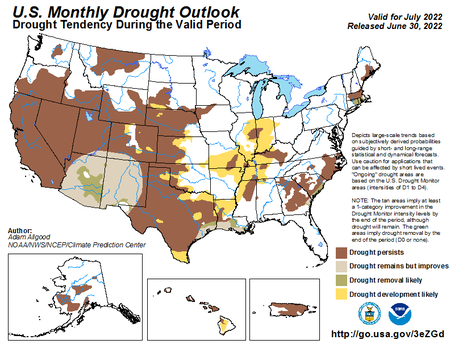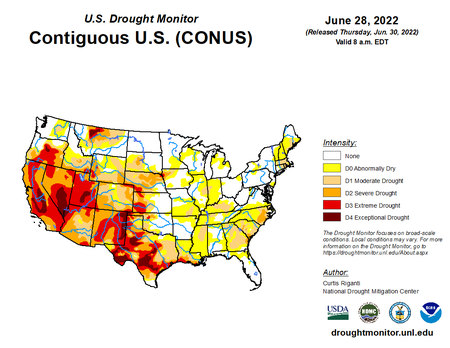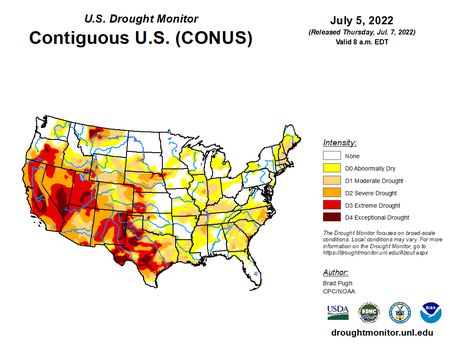Here’s a look at 5 headlines that you don’t want to miss this week.

Check out these five stories that are dominating the news this week.
1. Dry conditions are worsening
It’s clear as drought maps are compared, dry conditions are moving west. This could mean problems for even more cattle producers. Grain prices are hay and many hay producers are starting to realize some fields won’t be producing any more hay until rain is felt in the east.



2. Advocates appeal state decision to grant permit to Iowa cattle feedlot
Seven Iowans have appealed state regulators’ decision to grant a water use permit to an 11,600-head northeast Iowa cattle feedlot.
An attorney for the group, which has formed the Committee to Save Bloody Run, announced the appeal Monday.
The Iowa Department of Natural Resources earlier this month granted the water use permit to the feedlot, which is near Monona and operated by Supreme Beef LLC. It was a renewal of a permit first issued in 2017.
Neighbors and environmental groups expressed concerns that the feedlot will draw more water than stated in its permit renewal request.
The Committee to Save Bloody Run’s appeal disputes assertions by Supreme Beef that its water use will not affect Bloody Run Creek or other waterways in the region and asks the state to revoke the water use permit.
3. Radford man charged in cattle rustling case
A case involving stolen cattle said to have been sold in the northern Shenandoah Valley led to the arrest of a Radford man, according to the Pulaski County Sheriff’s Office.
Christopher Eugene Gregory has been charged for the larceny of the livestock and obtaining money by false pretenses, the sheriff’s office said.
The sheriff’s office said it received a report earlier this month of cattle rustling in the Snowville area of Pulaski County. The victim, according to the agency, said five cows and four calves that were missing from the field where they were contained.
Investigators, with aid from citizens, found a suspect who confessed to taking the cattle and selling them in Winchester for $1,100, the sheriff’s office said.
The sheriff’s office said the location of the missing cattle and identity of the buyer are still being investigated.
Major Daniel Johnson, of the Pulaski County Sheriff’s Office, wrote in an email Friday that he wanted to get the information circulated in Winchester in an attempt to retrieve the cattle. He raised concerns about the cattle being sold quickly due to the buyer’s knowledge of the cattle’s stolen status and the purchase price.
4. As grass and water supply dwindle, ranchers sell off cattle
North Texas ranchers are selling off cattle by the thousands as grass and water disappear during an expanding summer drought.
Videos spread on social media Saturday and Sunday, showing trucks and trailers lined up for miles outside of livestock markets.
At the Decatur Livestock Market, owner Kimberly Irwin said trucks were stacked a mile in each direction, eventually unloading more than 2,600 animals. It's the highest numbers they've seen going back to the extreme drought and heat of 2011.
Grass has stopped growing with no rain and 100 degree temperatures. Grasshoppers have reportedly been destroying what's available in some counties. Stock ponds are now starting to run low on water as well.
The USDA released a report Monday showing 83% of pasture and range land is now considered to be in poor to very poor condition.
"You know, you want to hang on, but it's just hard," Irwin said Monday.
Most of the cows being sold have been older she said, with owners hoping they can hang on to younger animals and make it until conditions change. As they start to get thinner though, they won't yield as much at market, leaving owners with a difficult decision.
"I don't think it can break quick enough to save me, to tell the truth," said Lee McLachlin, who drove up to Decatur from Springtown on Monday.
He was watching to see what the market was like, holding off as long as he can with his own cows, but knowing even a good rain now wouldn't do much to bring the grass back quickly. He's concerned about hay availability as well for later in the year, with prices now already running over $100 for a bale.
Usually there are some local buyers at the Decatur sale, Irwin said, taking a few cows back home. Lately though almost all the buyers have been meatpackers. With demand for cattle still high, she expects the sell off to continue, at least in the short term unless conditions improve.
5. Lifelong disease found in Maury County cattle
The state veterinarian is finding cases of a lifelong parasite called “Theileria orientalis” in a herd of cattle in Middle Tennessee.
The Tennessee Department of Agriculture found an affected herd in Maury County that shows signs of illness and lethargy, and despite veterinary attention and antibiotic treatments, some animals have died.
Theileria is a tickborne parasite that infects red and white blood cells and causes severe anemia in cattle, according to the news release.
Once an animal is affected, it carries the parasite for life.
“The Asian longhorned tick is a common vector for this illness,” State Veterinarian Dr. Samantha Beaty said. “Although we have not yet confirmed the presence of ALT in Maury County, we know it’s already taken hold in several other Tennessee counties and will continue to spread. Cattle producers should take steps to protect their herds.”
Anyone who owns cattle can minimize the risk of their cattle getting Theileria by keeping them from wooded areas and keeping the grass short. The Tennessee Department of Agriculture also recommends that people check their cattle for ticks with ear tags, pours, back rubbers and any other additional pesticide killer.
Humans cannot get Theileria through direct contact with an affected animal. The meat from an affected cattle was also deemed safe as long as it’s cooked at the appropriate temperature.
About the Author(s)
You May Also Like

.png?width=300&auto=webp&quality=80&disable=upscale)
.png?width=300&auto=webp&quality=80&disable=upscale)
